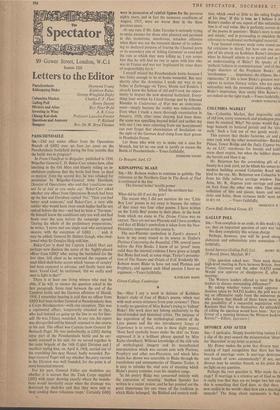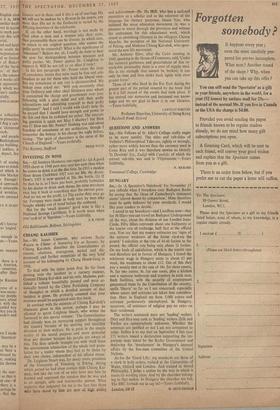DIVORCE AND AFTER
SIR,—I apologise. Sloppy handwriting (unless I a slip of the pen) caused the misquotation 'clese for 'discretion' in my letter as printed.
Mr. Power makes the point that divorce may seeking of legal recognition that there has be breach of marriage vows. Is marriage destroye one breach of vows automatically? If not, sec divorce may be another breach, so his point th no light on my question.
Perhaps the root question is, Who made the riage? If marriage is a creative act of God so tl is really true that they are no longer two but on this is something that God does, so that there new reality in the world—then how can a marriat unmade? The thing about sacraments is that Creator acts in them, and if this is so of marriage His act will not be undone by a divorce in the courts, any snore than His act in the Eucharist is varied by the differing doctrines of the celebrants.
If, on the other hand, marriage is not made by God when a man and a woman take their vows, then presumably there can be divorce. In which case, to return to my original question, why cannot the guilty party be remarried? What is the significance of innocence'? Believe me, sir, I really do want to hear the case for distinguishing between innocent and guilty parties. Mr. Power quotes Dr. Creighton to support it. Will he not tell us on what it rests? In his last paragraph Mr. Power raises the issue of conscience, insists that mine must be free and asks freedom to act for those who hold the liberal view. But my conscience at any rate is circumscribed. My bishop once asked me: Will you reverently obey your Ordinary and other chief Ministers unto whom is committed the charge and government over you; following with a glad mind and will their godly admonitions and submitting yourself to their godly judgments?' And I said I would with God's help. So he prayed that I should have strength and power to do this and then he ordained me priest. The interest- ing question is again not May I disobey? but How can I? How can Mr. Power? Nothing was said about freedom of conscience at my ordination, though I remember the bishop, in his charge the night before, saying : 'The spirit of choosiness is the curse of the Church of England.'—Yours faithfully,
The Rectory, Stafford PETER WYLD



























 Previous page
Previous page